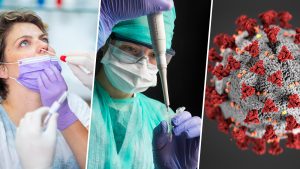Since the onset of the COVID-19 pandemic, testing has been at the center of public health strategies across the globe. But for many Americans, the evolving science and ever-changing terminology surrounding coronavirus testing can feel overwhelming. What’s the difference between a PCR test and an antigen test? How do antibody tests work, and what do they actually tell you?
To clear up the confusion, we turned to Chris Dukes, BSMT (ASCP), MBA, Senior Director of Laboratory Services at Bayhealth, for a comprehensive breakdown of the different types of COVID-19 tests and how they’re used. Whether you’re preparing for a test, interpreting your results, or simply trying to understand how testing fits into the bigger pandemic picture, this guide is for you.

The Two Main Types of COVID-19 Tests
All COVID-19 tests fall into two primary categories: viral tests and antibody tests. These serve distinct purposes and are used at different stages of a COVID-19 infection.
Viral Tests: Detecting an Active COVID-19 Infection
A viral test determines whether someone is currently infected with SARS-CoV-2, the virus that causes COVID-19. There are two main types of viral tests:
1. PCR Tests (Polymerase Chain Reaction Tests)
-
Also known as: molecular tests, genetic tests, RNA tests
-
How it works: PCR tests amplify the virus’s genetic material to detect even tiny amounts in a sample.
-
Sample type: nasal swab, throat swab, or saliva
-
Accuracy: Considered the gold standard for COVID-19 detection
-
Processing time: Ranges from 24 hours to several days, depending on lab capacity
Why it’s trusted: PCR technology is extremely sensitive and can detect the virus early in infection. However, the complexity of testing means that results are not always rapid.
2. Antigen Tests (Rapid Tests)
-
Also known as: lateral flow tests, rapid diagnostic tests
-
How it works: Antigen tests detect specific proteins (spike proteins) from the virus’s outer shell.
-
Sample type: nasal or throat swab
-
Accuracy: Less sensitive than PCR; may produce false negatives
-
Processing time: Results typically available in 15–30 minutes
When it’s used: Antigen tests are useful for quick screenings or in high-risk settings like schools, clinics, or travel hubs, though they may miss early infections.
Antibody Tests: Identifying Past COVID-19 Infections
Antibody tests, also called serology tests, detect antibodies in your blood that are produced by the immune system in response to a COVID-19 infection.
How Antibody Testing Works
-
Sample type: Blood draw or finger prick
-
Timing: Antibodies typically appear 1–3 weeks after infection
-
What it shows: Whether you were infected in the past—not a current infection
There are two key antibodies detected by these tests:
-
IgM (Immunoglobulin M): Appears early and indicates a recent infection.
-
IgG (Immunoglobulin G): Appears later and suggests previous exposure. Its presence may indicate some immunity, although it’s still unclear how strong or long-lasting that immunity is.
Important note: A negative antibody test doesn’t always mean you haven’t had COVID-19. It may be too early in your immune response for antibodies to be detectable.
The Role of the FDA and Public Health Systems
As demand for COVID-19 testing surged during the pandemic, the U.S. Food and Drug Administration (FDA) granted emergency use authorization for hundreds of test kits, particularly antibody tests. However, not all tests underwent formal FDA review, and performance varies widely between brands.
According to Dukes, this variability makes it crucial to understand that a positive test from one manufacturer may not mean the same thing as a result from another.
Testing Practices and Statewide Coordination
Access to COVID-19 testing varies by location, healthcare provider, and even testing availability. In Delaware, for example, Bayhealth and other hospital systems worked closely with the Department of Public Health to ensure consistent testing methods and standards across the state.
Standardized Testing Algorithms
According to Brad D. Kirkes, MBA, MHA, OTR/L, CHT, FACHE, Vice President of Ancillary and Clinical Services, all participating hospitals agreed to use consistent algorithms for both PCR and antibody testing.
Summary: Which COVID-19 Test Is Right for You?
| Test Type | Purpose | Sample | Speed | Accuracy | Best For |
|---|---|---|---|---|---|
| PCR | Detect active infection | Swab or saliva | Slower (1–5 days) | High | Confirming infection |
| Antigen | Detect active infection | Swab | Rapid (15–30 mins) | Moderate | Quick screening |
| Antibody | Detect past infection | Blood | Moderate (1–2 days) | Varies | Checking prior exposure |
Frequently Asked Questions:
Q1. What’s the difference between a PCR test and an antigen test?
A: PCR tests detect the virus’s genetic material and are highly accurate but slower. Antigen tests detect viral proteins and give faster but less sensitive results.
Q2. When should I get an antibody test?
A: Antibody tests are useful if you believe you had COVID-19 in the past. They’re typically accurate a few weeks after symptoms begin.
Q3. Can a negative test mean I don’t have COVID?
A: Not always. Early testing or a less sensitive test may produce false negatives. If you have symptoms, follow up with a PCR test.
Q4. How long does it take to get PCR test results?
A: PCR results can take anywhere from 24 hours to several days, depending on lab processing time and local demand.
Q5. Does a positive antibody test mean I’m immune to COVID-19?
A: Not necessarily. It indicates past exposure, but scientists are still studying how long immunity may last or how effective it is.




